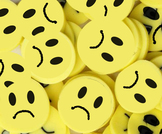 Why are we chronically unhappy? When I speak to practically anyone around me, I hear unhappy voices, see grim faces, and contracted bodies. Most people today complain of being unhappy and not satisfied in life. Of course everyone's ego ideal is to live a happy life and to “live life to the fullest”. But the illusion of a happy life seems to elude most people. What is happiness? We can say that we are generally happy when we feel pleasure in our body. Pleasure is feeling which like all other feelings is felt in the body. It is related to expansiveness and openness. Are we then incapable of feeling pleasure to a large extend? The answer based on what people say regarding being unhappy must be “No”! People seem to be able to sense excitement which results in very short lived sensation of pleasure. Excitement is a sensory phenomenon that diminishes shortly after excitement ends. People seek excitement and thrill in order to feel some level of aliveness in their bodies. We live in a narcissistic age, in which image is more important than reality (it may even replace reality), consequently our true self is denied, and replaced with an image. If we deny our true self, we also must by very definition deny our feelings as feelings are perceptions of emotions that originate in our body – our true self. We also had to cut off our feelings as children when our heart was broken through many disappointments, rejections, and loss of love by our significant caretakers. The narcissistic identification with an image and denial of our true self also serve to compensate for the shame of not being seen for who we were and consequent rejection and heartbreak by our caretakers. Having to deny or cut off our feelings all that is left is excitement which gives us a passing moment of feeling “something” which quickly fades. The more alive we are the more we feel, and conversely the more we feel the more alive we are. Dead people have no feelings. Having suffered many rejections and heartbreaks, we become fearful of life and aliveness. Being alive means feeling our emotions, but this will take us back to when we suffered heartbreaks which are too painful to bear. We thus develop a fear of life and living. We seek refuge in our head and deny our body, and focus on achievements, power, money, thrills and excitements, push ourselves to the limit until life breaks us down (heart attack, cancer, auto-immune diseases, etc). We have thus failed! Ironically it is this failure that may provide us with the possibility of recovery. For some this breakdown occurs too late, making it very hard to recover. For some the breakdown provides a moment of self reflection and change in the direction of life. To paraphrase John Pierrakos, MD (co-founder of Bioenergetic Analysis): One of most important tasks of therapy is to help our clients before life breaks them down. To regain our ability to feel pleasure and the capacity to live a happy life, we need to recover our body. We need to breathe, open and soften the thoracic cage which keeps our heart in isolation in order to protect us from heartbreak. If we don't breathe, we won't feel. Dead people do not breathe and do not feel. Suppression of feelings occurs through chronic contraction of musculature responsible for expression of those same feelings. Thus, we also need to release the tension held in our tight musculature which contains a record or our traumas and heartbreaks. Earlier I pointed out that pleasure is related to expansion and pain/anxiety to contraction of body and musculature. The converse must also be true, in that our capacity to feel pleasure is greatly diminished if our body is tight and contracted. I will end this blog by quoting Alexander Lowen MD (founder of Bioenergetic Analysis): “We deaden our bodies to avoid our aliveness, and then pretend to be alive to avoid our deadness.” Comments are closed.
|
AuthorHomayoun Shahri Archives
May 2016
Categories
All
|
Ravonkavi Privacy Policy
©2018 Ravonkavi
©2018 Ravonkavi

 RSS Feed
RSS Feed